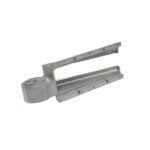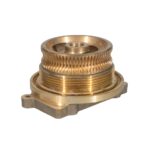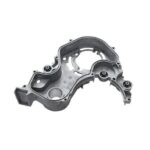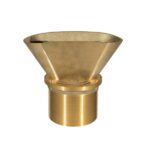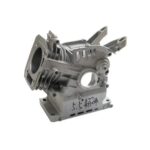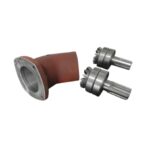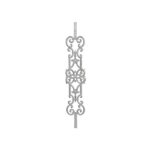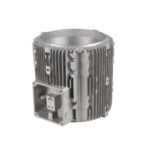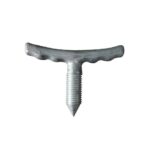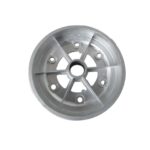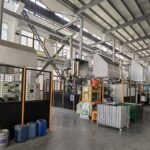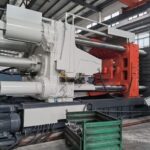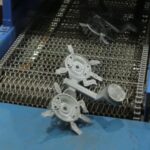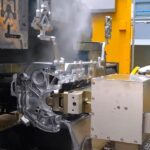How Important Is Manufacturing Design to Your Order?
Design for Manufacturing (DFM) is a critical process in modern production, aimed at optimizing products for ease of manufacturing.
By aligning design principles with production methods, DFM enhances efficiency, reduces costs, and improves quality. It is a cornerstone of effective manufacturing strategies, and its importance extends across various industries and product types.
The concept of DFM emerged during the mid-20th century, driven by the need for streamlined production processes during the industrial boom.
Initially pioneered by engineering and design professionals, it has since evolved into a standard practice supported by manufacturing associations like the North American Die Casting Association (NADCA) and ISO guidelines.
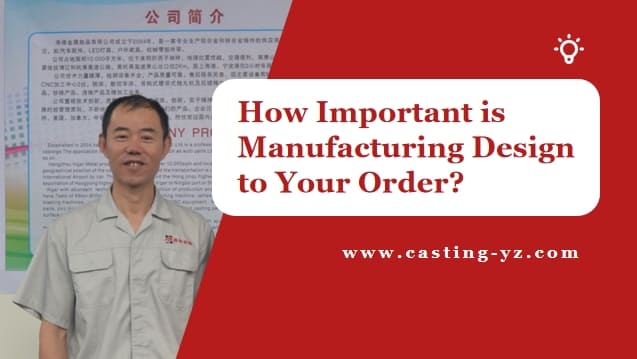
Why Does DFM Matter?
DFM bridges the gap between design intent and production reality, ensuring that the final product meets specifications while remaining cost-effective.
By identifying and addressing potential manufacturing flaws early in the design phase, DFM eliminates inefficiencies, reduces waste, and speeds up time-to-market.
Key benefits include:
- Reduced Costs: Simplified designs minimize material use and labor.
- Improved Quality: Enhanced precision leads to fewer defects.
- Faster Production: Streamlined processes enable quicker assembly.
Buyers are increasingly attentive to DFM practices, especially in competitive markets like automotive, electronics, and aerospace.
For instance, Tesla’s Model S and Boeing’s Dreamliner demonstrate how DFM principles improve production scalability and product reliability.
Searching for High-Quality for Cast Aluminum Parts?
You’ve come to the right place! Yongzhu Casting is a certified die casting manufacturer with over 20 years of expertise in the industry.
We have successfully completed numerous die casting projects for Aluminum casting parts, particularly in your industry.

Zhejiang Yongzhu Casting Technology Co., Ltd.
Location: Zhejiang, Shaoxing
Company type: Manufacturing
Year Founded: 2004
Main Products: Aluminium die casting, Mold Making, Die Casting, Sand Casting, Gravity Casting
Leading Chinese producer Yongzhu Casting is formerly known as Hangzhou Higer Metal Products Co., Ltd., was established in 2004.
With 20 years of experience in the industry, we are a specialized manufacturer in Aluminum casting and Machining.
Our products are widely used in various applications such as Automotive, Energy, Lighting, Medical, Home Furnishings, Machinery & Equipment etc. Below is one of our products.
It’s worth mentioning that the evolution of rapid logistics has transformed how industries approach purchasing. Aluminum casting orders can now be sourced from overseas suppliers efficiently.
For instance, working with YONGZHU CASTING, you can inquire, order, and even find better value than your local options—all while maintaining assured quality.
Design Review & DFM Support
Our professionals will evaluate your designs and provide suggestions for cost savings. Additionally, we offer Design for Manufacturing (DFM) assistance and conduct mold flow analyses to facilitate efficient production.
State-of-the-Art Manufacturing Equipment
Our facility is equipped with advanced hot-chamber and cold-chamber die casting machinery for aluminum and zinc production.
We also utilize high-precision CNC machines in a temperature-controlled workshop, featuring 3-Axis, 4-Axis and 5-Axis setups to manage any project you have.
Rigorous Quality Control Measures
Our dedicated quality control team ensures that all parts meet the highest standards of quality and consistency. We employ high-accuracy measurement instruments, including CMM, spectrometers, and X-ray detectors.
Comprehensive Surface Treatment Options
We provide a variety of surface finishing techniques for your precision die casting components. Our in-house services include cleaning, polishing, anodizing, shot blasting, and painting.
Flexible Project Acceptance
While larger manufacturers often shy away from low-volume projects, and smaller ones may struggle with quality, Yongzhu Casting stands apart. We prioritize customer satisfaction and willingly accept high-mix, low-volume projects like yours.

Understanding the Impact of DFM on Products and Processes
Standards and Associations
While there are no universal standards, several organizations provide guidelines. The ISO 9001 framework emphasizes quality management, while NADCA offers specific recommendations for die casting. These standards ensure consistency in applying DFM principles across industries.
Common Misconceptions
Unfamiliar terms or abbreviations can mislead non-professionals. For example, some might confuse DFM with similar-sounding terms like “Design for Maintenance.” Clarifying its meaning helps buyers and stakeholders grasp its relevance.
Applicability Across Products
Not all products require DFM. Highly customized, low-volume items may not benefit significantly. However, for mass-produced items like electronics, vehicles, and industrial machinery, DFM is indispensable.
Key Principles of DFM
- Simplifying Designs Reducing part complexity enhances manufacturability and reduces errors.
- Material Selection Choosing the right materials affects durability, cost, and production speed.
- Optimized Assembly Designing for easier assembly cuts labor costs and accelerates production.
- Iterative Prototyping Prototyping helps identify flaws early, ensuring a more efficient production process.
- Collaborative Development Integrating input from manufacturing teams during the design phase ensures feasibility.
Addressing Sustainability Through DFM
In today’s eco-conscious environment, DFM contributes to sustainable manufacturing:
- Recyclable Designs: Products are designed for disassembly and material recovery.
- Waste Reduction: Efficient processes lower material wastage.
- Eco-Friendly Materials: Using biodegradable or low-impact materials reduces environmental footprints.
Conclusion
Design for Manufacturing is pivotal for modern production, offering a competitive edge through cost savings, enhanced quality, and faster delivery. By understanding its principles and integrating them into the production process, manufacturers can create better products while meeting the demands of a dynamic market.
Frequently Asked Questions (FAQs)
- What is the main goal of DFM?
To simplify designs, reduce production costs, and improve product quality while enhancing manufacturing efficiency. - When did the concept of DFM originate?
DFM emerged in the mid-20th century during the industrial expansion, spearheaded by engineering and design innovations. - Does every product require DFM?
No, DFM is most valuable for mass production but may not be critical for custom or low-volume items. - Are there standards for DFM?
While there is no universal standard, ISO 9001 and NADCA guidelines offer frameworks for implementation. - How does DFM impact sustainability?
DFM promotes recyclable designs, reduces waste, and encourages the use of eco-friendly materials. - What industries benefit most from DFM?
Automotive, aerospace, electronics, and consumer goods industries leverage DFM for scalability and precision. - Do buyers consider DFM when choosing suppliers?
Yes, buyers value DFM for its role in ensuring cost-effective and high-quality production. - What are some common DFM tools?
Tools like Failure Mode and Effects Analysis (FMEA), CAD simulations, and Design for Assembly (DFA) enhance DFM analysis. - Can DFM reduce time-to-market?
Absolutely, by addressing potential manufacturing issues early, DFM accelerates production timelines. - What is a common misconception about DFM?
Some mistake it for “Design for Maintenance,” but DFM specifically focuses on manufacturability.


